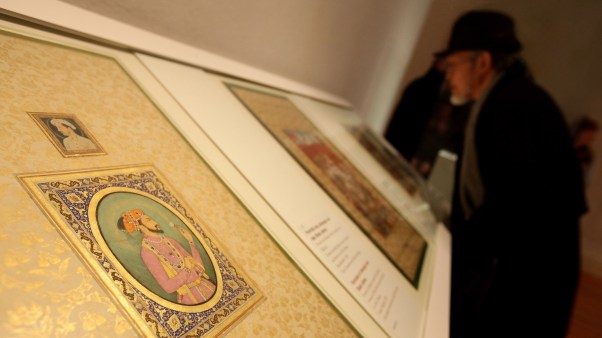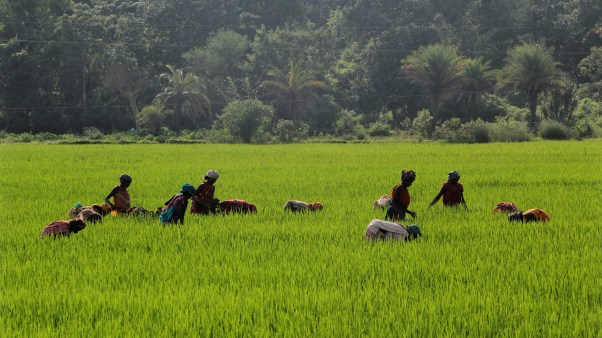Like most people, I’ve been paying a lot more attention to Haiti in the past few weeks than ever before. I know very little about the place. It comes up just twice in my U.S. history survey course, once in the lecture on New World colonization, and again in a lecture on slave uprisings. For my own knowledge as well as for this blog, I thought I’d try to sketch a religious history of Haiti—one that does not include a national pact with the devil.
The island of Hispaniola, now divided between Haiti and the Dominican Republic, bore the brunt of early Spanish colonization of the New World. Christopher Columbus explored its northern coast in 1492, and his favorable reports, along with Spain’s quest for riches and global dominance, soon brought many more soldiers, priests, and economic adventurers. Bartolome de las Casas, a Dominican priest whose father and uncles joined Columbus’s second expedition, witnessed the results of this conquest. He titled his wrenching narrative, A Short Account of the Destruction of the Indies (1542). It begins:
The Indies were discovered in the year one thousand four hundred and ninety-two. In the following year a great many Spaniards went there with the intention of settling the land. Thus, forty-nine years have passed since the first settlers penetrated the land, the first so claimed being the large and most happy isle called Hispaniola…
And of all the infinite universe of humanity, these [indigenous] people are the most guileless, the most devoid of wickedness and duplicity, the most obedient and faithful to their native masters and to the Spanish Christians whom they serve. They are by nature the most humble, patient, and peaceable, holding no grudges, free from embroilments, neither excitable nor quarrelsome. These people are the most devoid of rancors, hatreds, or desire for vengeance of any people in the world….
Yet into this sheepfold, into this land of meek outcasts there came some Spaniards who immediately behaved like ravening wild beasts, wolves, tigers, or lions that had been starved for many days. And Spaniards have behaved in no other way during the past forty years, down to the present time, for they are still acting like ravening beasts, killing, terrorizing, afflicting, torturing, and destroying the native peoples, doing all this with the strangest and most varied new methods of cruelty, never seen or heard of before, and to such a degree that this Island of Hispaniola, once so populous (having a population that I estimated to be more than three million), has now a population of barely two hundred persons.
With the native population annihilated, mostly by disease, the Spanish conquerors looked to the African slave trade for a new labor supply. Religion in Hispaniola thus became a mixture of indigenous Caribbean and imported African practices, overlaid with Roman Catholicism. That mixture produced voodoo (or Vodou), which perhaps half of all Haitians practice, despite the fact that some 80 percent of Haitians formally identify as Roman Catholics, and most of the rest formally identify as Protestants.
According to the website of the Cultural Orientation Resource Center, an organization that aids the resettlement of refugees, the word “voodoo” means “spirit” in the Fon language of West Africa. The COR describes voodoo as “a religion based on family spirits [loas] who generally help and protect. Although lacking a fixed theology and an organized hierarchy, voodoo is a religion with its own rituals, ceremonies, and altars that practitioners do not find to be at odds with Roman Catholicism. In fact, many Roman Catholic symbols and prayers have blended with voodoo rituals and traditions to make for a unique and typically Haitian religion. For example, pictures of Catholic saints are painted on the walls of temples to represent the voodoo spirits; at funerals, it is not uncommon that voodoo ceremonies and rituals be performed for family members first, followed by a more public traditional Roman Catholic ceremony presided over by a priest.”
The “pact with the devil” mentioned by Pat Robertson was actually a voodoo ceremony performed in August 1791. France was at that time the ruling colonial power in Haiti, having acquired the western part of Hispaniola from Spain in 1697. Haitian slaves, fed up with brutal repression (one-third of imported African slaves died within a few years of arriving in Haiti) and inspired by the French Revolution, staged the most successful uprising in the western hemisphere. Though the rebellion’s principles originated in France, its opening event, as described by the official Haitian Bicentennial website, was a voodoo ceremony:
A man named Boukman … organized on August 14, 1791, a meeting with the slaves in the mountains of the North. This meeting took the form of a Voodoo ceremony in the Bois Caiman in the northern mountains of the island. It was raining and the sky was raging with clouds; the slaves then started confessing their resentment of their condition. A woman started dancing languorously in the crowd, taken by the spirits of the loas. With a knife in her hand, she cut the throat of a pig and distributed the blood to all the participants of the meeting who swore to kill all the whites on the island. …
The Revolution that would give birth to the Republic of Haiti was under way and nothing could stop it. Toussaint Louverture was the great leader who emerged out of the mass of the revolted. He proved to be a military genius and a formidable leader. He organized the masses of the slaves into an organized army. With political manipulation, and military campaigns, he would gain more and more notoriety in the colony. During the period of 1791, to 1800, Toussaint used the French, the Spaniards and the English against one another. He managed to eliminate all his enemies until he was the only power left in St Domingue (Haiti). By 1801, he was governing the whole island by himself and proclaimed himself governor of the colony. A constitution was soon drawn that same year declaring St Domingue an autonomous French possession where slavery was abolished.
Louverture’s own religious beliefs were complicated. A 1907 book, Haiti: Her History and Detractors, claimed that Toussaint attended Boukman’s 1791 voodoo ceremony but suppressed the religion after coming to power, perhaps to stifle a political force he feared could turn against him. Wikipedia described the leader as a devout Catholic who also, like many American revolutionaries, attained high rank as a Mason. He may have been all of these things. One thing is sure: his name means “all souls rising,” an apt name for the founder of a nation with a long history of glories, disasters, and spiritual upheaval.








